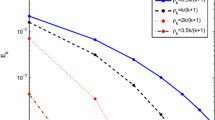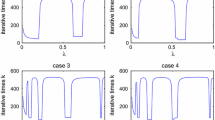Abstract
In this work, we introduce an inertial Halpern-type CQ algorithm for solving split feasibility problems in Hilbert spaces. The main advantages of the proposed algorithm are that the introduced stepsize is bounded away from zero and a strong convergence theorem for our method is established without assuming Lipschitz continuity of the gradient operator. Some preliminary numerical experiments are provided for illustration and comparison.


Similar content being viewed by others
References
Agarwal, R.P., Regan, D.O., Sahu, D.R.: Fixed Point Theory for Lipschitzian-Type Mappings with Applications, Topological Fixed Point Theory and Its Applications. Springer, New York (2009)
Alvarez, F., Attouch, H.: An inertial proximal method for maximal monotone operators via discretization of a nonlinear oscillator with damping. Set-Valued Anal. 9, 3–11 (2001)
Anh, P.K., Vinh, N.T., Dung, V.T.: A new self-adaptive CQ algorithm with an application to the lasso problem. J. Fixed Point Theory Appl. 20, 142 (2018)
Antipin, A.S.: On a method for convex programs using a symmetrical modification of the Lagrange function. Ekon. Mat. Metody 12, 1164–1173 (1976)
Bauschke, H.H., Combettes, P.L.: A weak-to-strong convergence principle for fej\(\acute{e}\)r-monotone methods in Hilbert spaces. Math. Oper. Res. 26, 248–264 (2001)
Bauschke, H.H., Combettes, P.L.: Convex Analysis and Monotone Operator Theory in Hilbert Spaces. Springer, New York (2011)
Byrne, C.: Iterative oblique projection onto convex sets and the split feasibility problem. Inverse Probl. 18, 441–453 (2002)
Byrne, C.: A unified treatment of some iterative algorithms in signal processing and image reconstruction. Inverse Probl. 20, 103–120 (2004)
Ceng, L.C., Ansari, Q.H., Yao, J.C.: Mann type iterative methods for finding a common solution of split feasibility and fixed point problems. Positivity 16, 471–495 (2012)
Censor, Y., Elfving, T.: A multiprojection algorithm using Bregman projection in a product space. Numer. Algorithms 8, 221–239 (1994)
Censor, Y., Elfving, T., Kopf, N., Bortfeld, T.: The multiple-sets split feasibility problem and its applications for inverse problems. Inverse Probl 21, 2071–2084 (2005)
Cholamjiak, P., Sunthrayuth, P.: A Halpern-type iteration for solving the split feasibility problem and the fixed point problem of Bregman relatively non- expansive semigroup in Banach spaces. Filomat 32, 3211–3227 (2018)
Dang, Y., Sun, J., Xu, H.: Inertial accelerated algorithm for solving a split feasibility problem. J. Ind. Manag. Optim. 13, 1383–1394 (2017)
Dong, Q.L., Yao, Y., He, S.: Weak convergence theorems of the modified relaxed projection algorithms for the split feasibility problem in Hilbert spaces. Optim. Lett. 8, 1031–1046 (2014)
Dong, Q.L., Tang, Y.C., Cho, Y.J., Rassias, Th.M.: ’ ’Optimal“ choice of the step length of the projection and contraction methods for solving the split feasibility problem. J. Global Optim. 71, 341–360 (2018)
Dong, Q.L., Yuan, H.B., Cho, Y.J., Rassias, Th.M.: Modified inertial Mann algorithm and inertial CQ-algorithm for nonexpansive mappings. Optim. Lett. 12, 87–102 (2018)
Ertürk, M., Gürsoy, F., Ansari, Q.H., Karakaya, V.: Modified Picard type iterative algorithm for nonexpansive mappings. J. Nonlinear Convex Anal. 19, 919–933 (2018)
Ertürk, M., Gürsoy, F., Ansari, Q.H., Karakaya, V.: Picard type iterative method with applications to minimization problems and split feasibility problems. J. Nonlinear Convex Anal. 21, 943–951 (2020)
Faikgürsoy, Sahu, D.R., Ansari, Q.H.: S-iteration process for variational inclusions and its rate of convergence. J. Nonlinear Convex Anal. 17, 1753–1767 (2016)
Fukushima, M.: A relaxed projection method for variational inequalities. Math. Program. 35, 58–70 (1986)
Gibali, A., Liu, L.W., Tang, Y.C.: Note on the modified relaxation CQ algorithm for the split feasibility problem. Optim. Lett. 12, 817–830 (2018)
Gibali, A., Mai, D.T., Vinh, N.T.: A new relaxed CQ algorithm for solving split feasibility problems in Hilbert spaces and its applications. J. Ind. Manag. Optim. 15, 963–984 (2019)
Halpern, B.: Fixed points of nonexpanding maps. Bull. Am. Math. Soc. 73, 957–961 (1967)
Kesornprom, S., Pholasa, N., Cholamjiak, P.: On the convergence analysis of the gradient-CQ algorithms for the split feasibility problem. Numer. Algorithms 84, 997–1017 (2020)
Korpelevich, G.M.: The extragradient method for finding saddle points and other problems. Ekon. Mate. Metody 12, 747–756 (1976)
López, G., Martin, V., Wang, F., Xu, H.K.: Solving the split feasibility problem without prior knowledge of matrix norms. Inverse Probl. 28, 085004 (2012)
Osilike, M.O., Aniagbosor, S.C.: Weak and strong convergence theorems for fixed points of asymptotically nonexpansive mappings. Math. Comput. Model. 32, 1181–1191 (2000)
Qu, B., Xiu, N.: A note on the CQ algorithm for the split feasibility problem. Inverse Probl. 21, 1655–1665 (2005)
Sahu, D.R., Cho, Y.J., Dong, Q.L., Kashyap, M.R., Li, X.H.: Inertial relaxed CQ algorithms for solving a split feasibility problem in Hilbert spaces. Numer. Algorithms (2020). https://doi.org/10.1007/s11075-020-00999-2
Shehu, Y., Gibali, A.: New inertial relaxed method for solving split feasibilities. Optim. Lett. (2020). https://doi.org/10.1007/s11590-020-01603-1
Suantai, S., Pholasa, N., Cholamjiak, P.: The modified inertial relaxed CQ algorithm for solving the split feasibility problems. J. Ind. Manag. Optim. 23, 1595–1615 (2018)
Suantai, S., Kesornprom, S., Cholamjiak, P.: A new hybrid CQ algorithm for the split feasibility problem in Hilbert spaces and its applications to compressed sensing. Mathematics 7, 789 (2019)
Suantai, S., Witthayarat, U., Shehu, Y., Cholamjiak, P.: Iterative methods for the split feasibility problem and the fixed point problem in Banach spaces. Optimization 68, 955–980 (2019)
Tibshirani, R.: Regression shrinkage and selection via the Lasso. J. R. Stat. Soc. Ser B 58, 267–288 (1996)
Vinh, N., Cholamjiak, P., Suantai, S.: A new CQ algorithm for solving split feasibility problems in Hilbert spaces. Bull. Malays. Math. Sci. Soc. 42, 2517–2534 (2018)
Wang, F.: On the convergence of CQ algorithm with variable steps for the split equality problem. Numer. Algorithms 74, 927–935 (2017)
Xu, H.K.: Iterative methods for solving the split feasibility in infinite-dimensional Hilbert spaces. Inverse Probl. 26, 105018 (2010)
Yang, Q.: On variable-step relaxed projection algorithm for variational inequalities. J. Math. Anal. Appl. 302, 166–179 (2005)
Yen, L.H., Huyen, N.T.T., Muu, L.D.: A subgradient algorithm for a class of nonlinear split feasibility problems: application to jointly constrained Nash equilibrium models. J. Global Optim. 73, 849–868 (2019)
Funding
The second author was supported by National Natural Science Foundation of China (Grant No. 11801430).
Author information
Authors and Affiliations
Corresponding author
Ethics declarations
Conflicts of interest
There are no conflicts of interest to this work.
Additional information
Publisher's Note
Springer Nature remains neutral with regard to jurisdictional claims in published maps and institutional affiliations.
Rights and permissions
About this article
Cite this article
Ma, X., Liu, H. An inertial Halpern-type CQ algorithm for solving split feasibility problems in Hilbert spaces. J. Appl. Math. Comput. 68, 1699–1717 (2022). https://doi.org/10.1007/s12190-021-01585-y
Received:
Revised:
Accepted:
Published:
Issue Date:
DOI: https://doi.org/10.1007/s12190-021-01585-y




